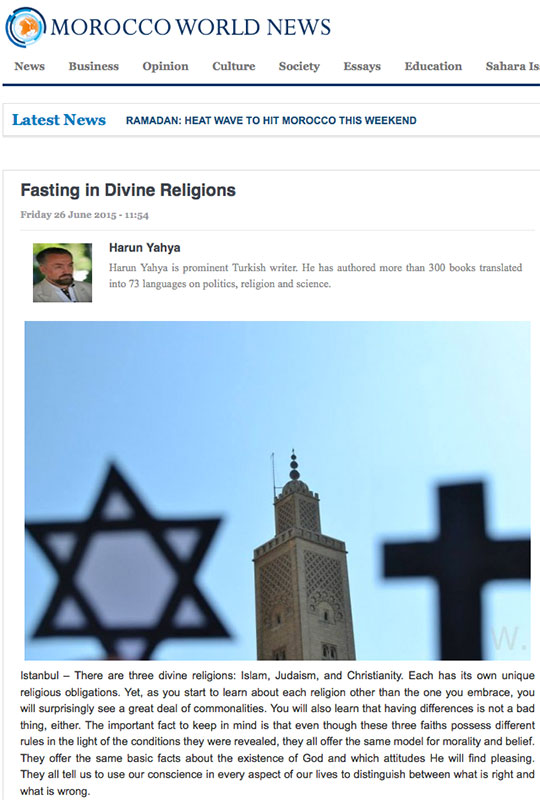
There are three divine religions: Islam, Judaism, and Christianity. Each has its own unique religious obligations. Yet, as you start to learn about each religion other than the one you embrace, you will surprisingly see a great deal of commonalities. You will also learn that having differences is not a bad thing, either. The important fact to keep in mind is that even though these three faiths possess different rules in the light of the conditions they were revealed, they all offer the same model for morality and belief. They offer the same basic facts about the existence of God and which attitudes He will find pleasing. They all tell us to use our conscience in every aspect of our lives to distinguish between what is right and what is wrong.
A great deal of knowledge by people of different faiths towards Islam is based on hearsay, and vice versa. Such information may well lead to erroneous conclusions and damage the friendship between people who embrace different faiths. The fact is that we do not need to accept this method to draw a conclusion. We can start dispelling such misconception about each other’s religion in many ways. The best way to learn the truth about other faiths is simply to go and sit with them, talk with them, eat with them, spend time with them, ask them about their religious obligations, ask them about their views about other faiths, and observe their lifestyles. You will likely be quite amazed how much fun you will have with them you will laugh together at the things you enjoy, eat your favorite foods together and above all you will be astonished as you will notice how many commonalities there are between their faith and yours.
Fasting is one of them, though there are slight differences amongst the different faiths in terms of the application. Fasting is considered as an act of religious obligation or penance in different faiths. During fasting, people are required to abstain from food and drink for a determined period of time. Some allow drinking and eating after the sunset while others allow its followers to only eat certain foods, even after the breaking of the fasting.
In Judaism, Jewish people fast six days a year, including Yom Kippur and Tisha B’Av, as an act of atonement. The Day of Atonement, in other words Yom Kippur is the only fast day commanded in the Pantateuch and for the individual to be cleansed from his sins, he is ordained, “You shall afflict your souls”. (Leviticus 16:29–31; 23:27–32; Numbers 29:7) Tisha B’Av, which means the Ninth of Av is considered a day of mourning of the destruction of the 1st and 2nd Temples and other disastrous events. You can encounter other fast days for the Jews mentioned in several sections of the Hebrew Bible like Ẓom Gedalyah (the Fast of Gedaliah), The Tenth of Tevet, and The Fast of Esther (Ta'anit Ester). Among those, only in Yom Kippur and Tisha B’Av, the person is obliged to abstain from food and drink from sunset till the nightfall of the succeeding day. In other fast days, fast starts before the dawn till the nightfall of the same day. If any of these days occur on a Shabbat, all are delayed till Sunday except the Yom Kippur. In addition to these fast days, there are other types of fasts like the ones ordained by the Rabbis and private fasts during occasions like for example the anniversary of the death of a parent.
It is not obligatory to fast in Christianity though the Bible mentions fasting as something valuable and useful. We observe Christians fasting before they make significant decisions in the Book of Acts. They feel it is a way to show their closeness to God and to demonstrate their devotion to Him by taking their eyes off the worldly materials. In the Book of Luke, we see praying and fasting attached together. In the Bible, we see examples of different kinds of fasts for different reasons of men of faith like Jesus and his disciples, Elijah, Daniel and Paul all of which have positive outcomes. The Bible recommends fasting as it makes the person focus on God rather than thinking of their worldly needs and desires.
In Islam, fasting is required to be completed in the month of Ramadan, in which the Holy Qur’an was first revealed. Muslims are obliged to abstain from food and drink from dawn until sunset for 29 or 30 days depending on the Islamic (Hijri) calendar. It is considered as one of the Five Pillars of Islam and constitutes an important part of the religious obligations of Muslims. Muslims fast because it is compulsory in Islam, and unlike what some people not familiar with Islam think, it is not a tradition in which parents teach their children to participate. Muslims contemplate fasting as the act of relinquishing worldly needs for a period of time to redirect their focus on drawing attention to God. Through fasting, believers ponder over the things they possess in this world, and they become thankful and grateful to God for everything He has bestowed on them. Fasting makes the believers’ willpower stronger and it allows them to gain empathy with the people who have no food to eat. It naturally draws people closer to God and increases their spirituality. It is a very pleasant feeling to know that every Muslim all over the world is fasting simultaneously in the same month of the year. It makes us feel we are acting as a united community and that we are all equal.


